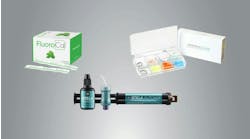By David Black, DDS
Almost every practice- management speaker and consultant I've heard in the 29 years I have been in practice seems to talk about "getting referrals" from current patients, family, friends, and staff. I have heard many fine speakers and have had several consultants in my office or used their services in one way or another. Usually, my staff and I can generate some referrals from their ideas. But, after a while, we get tired of the idea or get lazy and forget to follow through.
For me, there always has been something missing in terms of knowing how to motivate patients to refer new patients to me on a consistent basis over an extended period of time. In fact, I question whether even your best patients consciously consider referring other patients to you very often.
Most people only think of referring patients to you when directly asked about a specific dental need or when they are asked directly about you. I think that staff, close friends, and even family aren't actively looking for referral opportunities. Most people don't even think about your needs on a conscious level. I believe it takes a higher degree of commitment to refer clients than most people have. As a result, I believe you need to apply some old principles to obtain referrals in a different manner.
Some of the common techniques we all have been taught are simply to ask every patient to refer, to say thank you and send thank-you notes, to give gifts, to have a special end-of-treatment consultation to review the work you performed and then ask for referrals, and, lastly, to send out mailings and newsletters soliciting referrals. I continue to use most of these techniques in my practice.
It also is a given that you must have a pleasant office environment, treat the patient right, and provide gentle, quality care. You will go nowhere unless you have generated a high level of trust with your patients. However, even with all this in place, patients will refer only occasionally.
I had heard from several sources that forming a "Mastermind Group" was a good way to generate referrals. I tried to organize several of my friends to meet with me to help me with my business, but it never worked. I couldn't get people to commit. Looking back on this, it is obvious the approach should not have been to emphasize my business, but, rather, to concentrate on how to help my friends or how we collectively could help each other.
After the "Mastermind Group" did not work out, I thought: Why not join a group that already has done the field work on referrals, eliminated the techniques that don't work, and concentrates on what does work to consistently create a steady stream of clients? Several of these types of groups exist in many of the large- and medium-sized cities in the United States and around the world.
This "missing link" in the referral chain has helped me maintain and grow my new-patient referrals, while dramatically cutting back on my external marketing budget. Business Networking International (BNI) is one of these groups and the one with which I am the most familiar. The organization was founded in 1985 and it now has thousands of groups all over the world, passing millions of referrals to its members. For the most part, the dental profession is not familiar with BNI, but the rest of the business world is.
Why it works
There are several reasons I like this concept, whether we're talking about BNI or another group like it. These groups have been around for a while and have experimented with different formats concerning how often to meet and how the meeting should be conducted. They have kept the good and eliminated the bad. By helping others with their business, a trust is formed and the other members will actively seek ways to help you.
BNI groups meet every week at the same time, either before work or at lunch. Four things happen at these weekly meetings. Because of the structured format, members know what to expect and how to conduct themselves. The four regular agenda items are:
- Members introduce themselves and have one minute to tell what their business is and what type of referral they are looking for.
- Short announcements and officer's reports are made.
- One of the members gives a 10-minute presentation providing more details about his or her business.
- Members pass on referrals or give testimonials about other members.
In the introductory segment, each member tells what he or she does and describes what type of referral he or she would like to have that week. By being very specific about who or what type of referral you want, this educates the other members about how you do business and how you want to receive referrals. You are more likely to get a referral when you ask other members if they know a specific person to recommend to you, rather than asking for "someone or anyone" who needs dentistry. This one-minute "weekly commercial" is a constant reminder to the other members about your business and your needs.
The announcements segment pertains to who future speakers will be, how many referrals have been made, and when training programs will be held. Members rotate as speakers, so that several times each year, you will have the opportunity to give a 10-minute presentation about your business. This opportunity to speak is a key time for you to train other members of the group on how they can help you. You can explain what services you like to do in your practice, but a more important goal is to show your fellow members examples of a perfect referral. A short slide show of dental problems and their solutions is a great way to stimulate referrals.
Each meeting ends with testimonials about other members or passing referrals along to each other. This no-nonsense end to the meeting punctuates the fact that this is a business-networking group and that we mean to work the network. This group passes on only qualified referrals, not unqualified leads. A qualified referral is a referral in which the prospective client has been told about you and what you do, and has indicated that he or she would like to be contacted about your services. That differs from a "lead," in which someone casually mentions your name and what you do.
Each week, you see people who share a common goal of growing a business and who are constantly striving to provide you with a steady flow of referrals for your practice. The people referred to my practice by fellow BNI members are high-quality referrals who know they have a dental need and who want me to take care of it. The contact with you comes as a result of someone this individual trusts telling him or her about you. Acceptance of treatment is much higher than the average patient because you entered into the relationship with this person at a totally different level than a new patient who saw your ad in the Yellow Pages or who saw your sign as he or she was driving to work.
I am sure that if you were willing to expend enough energy and time, you could create your own group to try to accomplish the same goals. You could work out all the meeting formats, times, and systems until you found a system that worked for you. However, I am just lazy enough that I don't want to reinvent the wheel. With all the practice-management consultants saying that methodically working your client base for referrals is a good idea, I think that the "missing link" is to join a group like BNI. Enroll your fellow group members as your clients, and then, weekly, encourage and motivate them to refer other clients to you. This is a new and refined application of all the principles we have been taught to use to grow our practice through referrals. It is not easy and it takes a time commitment, but that is why it is called a "network."
We have been given many tools through years of practice-management classes and consultations to help us encourage people to refer to us. The "missing link" that no one has told us about is how to find a group of people who will refer to us on a consistent basis. To my way of thinking, a franchise group like BNI is the best way to work your referral network.
David Black, DDS, has practiced general dentistry for 29 years in Vinton, Va. For the past 15 years, he has focused his post-graduate study and practice emphasis on cosmetic procedures. He has studied at the Pankey Institute and at The Institute for Advanced Studies in Dental Esthetics. Dr. Black can be contacted by phone at (540) 342-7865 or by e-mail at [email protected].





